Transfer Orbit Roundup: Barfight

I hope that you’re safe where you are, given the snowstorm that’s caused problems for Texas. I’ve horrified at the images that I’ve seen from the storm, and have been reflecting on my relationship with winter here in Vermont, where I’m a homeowner.
I have vivid memories of enormous snowstorms as a child, and living in rural Vermont, it wasn’t uncommon for there to be at least one power outage that lasted for a day or so each winter. They weren’t so much scary as inconvenient: the house that my parents built was well-insulated, and features a cast-iron wood stove in the middle of the house, in a large gallery room whose ceiling is two stories high: it allows for heat to rise throughout the house, and we always made sure that our woodshed was stocked for at least two years. Vermont is not Texas, and I know that there’s little consideration for weatherizing a structure to endure those conditions.
But this goes beyond individual responsibility and what someone can do to be prepared for unexpected harsh weather. While it’s impossible to label any particular weather event as something induced by climate change, it does seem to fit with the broader pattern of behavior from the planet: storms appear to be more frequent and extreme. The planet’s temperature might be rising, but that doesn’t necessarily mean that all of those disasters will be tropical in nature.
We’ve entered the anthropocene, the geological age where we as humans have been a domineering force for the planetary changes, and while there’s certainly stories to tell about surviving the potential disasters before us, how we survive won’t come down to individuals who’ve etched out a plot of land and a bit of food to survive on, but how well we organize as a society and build a resilient society that helps everyone make it through.
While I’m distressed by the misinformation (renewable energy isn’t to blame), structural failures of the power grid, and notable (wealthy) politicians fleeing for warmer climates, I’m heartened by the reports of neighbors helping one another in small, manageable ways, like helping them stay warm, get power for their phones and devices, and so forth. It’s little things like that that make me think that we’re not doomed in the long-run.
This week’s been a quiet one for the world of SF/F, but there has been one notable story, and a continuation of one from last week.
The week in SF/F
Violent rhetoric at Baen’s Bar
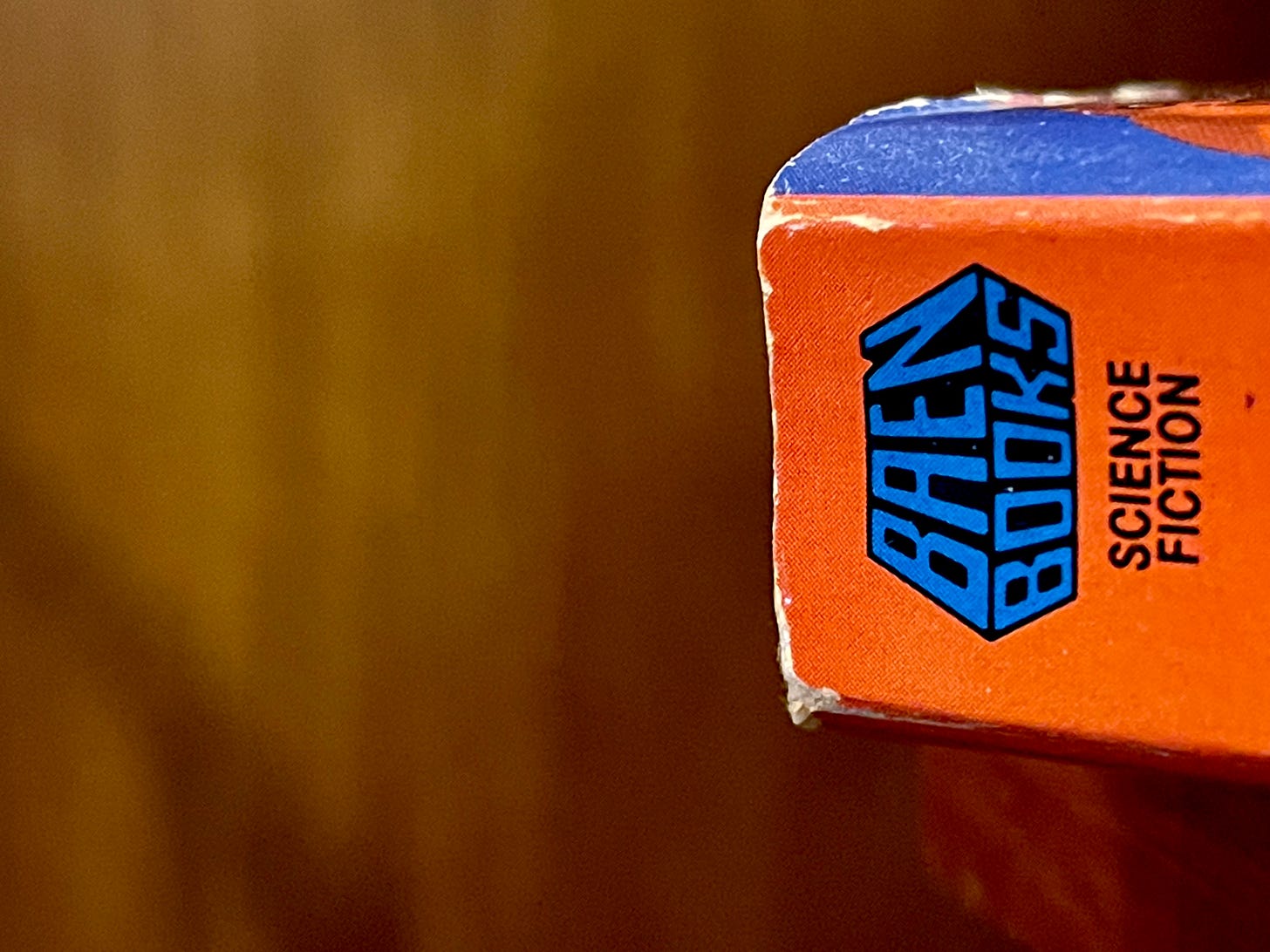
Baen books has long been a bit of a divisive publisher within the science fiction world. The publisher has been an innovative publisher, and has produced a number of great authors and works over the course of its history (I wrote about its founder, Jim Baen, a couple of years ago for Kirkus Reviews), and was an early entrant into using the web as a way to harness and build up a fanbase.
But the publisher is also largely known for its conservative mindset, with authors like Jerry Pournelle, Newt Gingrich, Larry Correia, Tom Kratman, and others in its bench, producing a lot of military science fiction and classic space opera. It’s not exclusively a right-wing publisher, but that does seem to be the space that they occupy. And given the political winds here in the US, it shouldn’t come as any surprise that their authors and readers are more aligned with conservative and alt-right politics.
In a new report from SF/F journalist Jason Sanford, those users have been discussing the political tides, and have sometimes been advocating for violent conflict after the November 3rd election and in the run-up to the January 20th inauguration of President Joe Biden.
In the report, Sanford outlines that the forum has incubated some violent rhetoric and conspiracy theories since the November 3rd election. It saw an influx of new members to its forums, and following the January 6th attack on the Capitol, with authors like Kratman advocating for armed resistance as a tool for political change. Others have talked about a second American Civil War, with volunteer moderators taking part in those discussions.
The report is worth a read, although I have some reservation about it: while Sanford positions this piece as an investigative report, there are some key things missing that would bring it up to a better journalistic quality: he didn’t reach out to Baen directly for comment (as he should have), and didn’t appear to reach out to any forum users with questions about the rhetoric that they’ve used on the forums.
There are ways to do this without being used to convey those views to one’s audience, and reaching out to subjects of a piece is a key part of the journalistic process: it gives journalists an opportunity to not necessarily understand or empathize with the views of those subjects, but it gives them a place to respond or clarify, and to ensure that you aren’t taking something out of context.
That said, it’s not an easy proposition when it comes to this type of political reporting. I don’t think that Sanford is wrong about any of the conclusions that he draws here, and that his piece is an important one that needs to be examined in a larger community. I just think that it could have been done slightly differently.
Nevertheless, Baen did respond to the report: publisher Toni Weisskopf announced that she’d be putting the forums on ice for a while while they investigate, later releasing a longer statement about the matter.
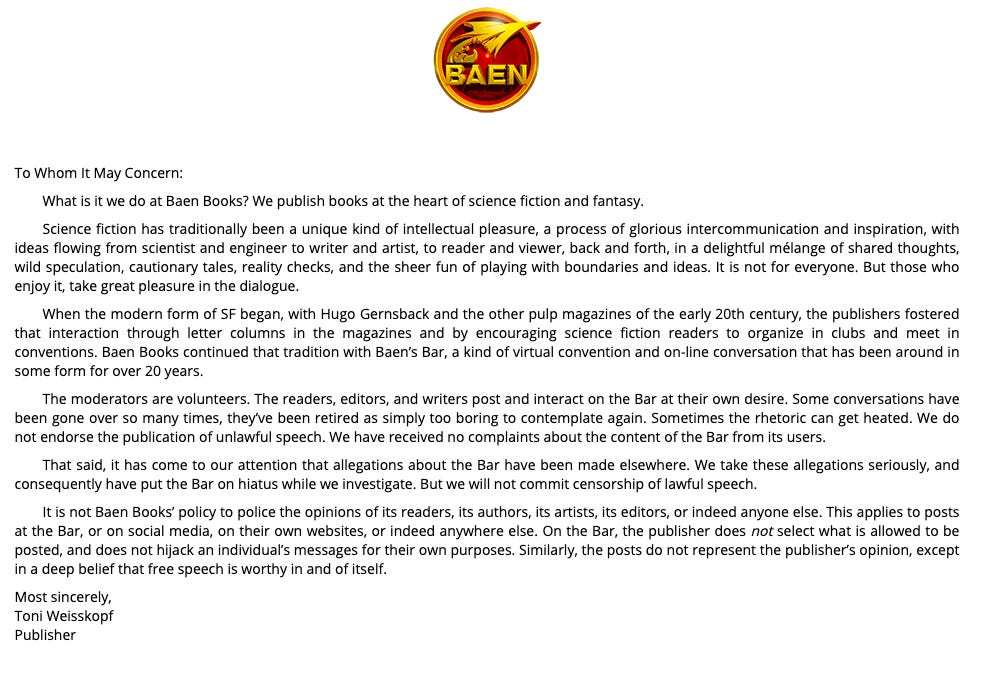
A key takeaway for me from this story is how it highlights the responsibility that companies bear for shaping the tenor of the discussion that they host on their platforms — either by taking a hands-off approach, or by moderating such discussions. It’s instances like this that demonstrate that a hands-off approach really can get out of control.
Baen says that it isn’t in the business of policing the opinions of its writers, readers, and users — which is a fair stance to take. But there is a difference between taking a hands-off approach to moderating one’s forums and allowing some dangerous speech that’s advocating for violence and hatred to run rampant. The last decade or so, we’ve seen how forums like 4chan, 8chan, Gab, Parlor, Reddit, and others can provide a nexus and connection point for like-minded individuals, and which can act as incubators for generating extremists, which can spin out into the real world with deadly consequences: there have been shootings, a rise in antisemitic hatred, and other attacks, which has some roots in the rhetoric in the online world.
This is where moderation is key: responsible companies will put together codes of conduct that their members should abide by, and enforce them. My thinking on this largely comes from my work on a feature on a Vermont social network called Front Porch Forum, in which they work to connect neighbors in their towns and municipalities as a sort of mutual-aid network. There’s certainly no shortage of discussion about politics that comes up — right now, my local one has been yelling back and forth about some folks running who’ve said some terrible things online and in school board meetings. The company won’t moderate you, unless you go against their code of conduct — which includes personal attacks against someone. All of those posts are reviewed before they go up, and posts are released once a day around 5pm.
FPF sets the tone of the discussion by setting their expectations right up front: there’s the expectation that you’re civil and neighborly, and as a result, the discussions here aren’t the strident, dramatic things that we see coming out of other forums.
There’s been predictable outcry from the forum’s users, and no small amount of think pieces for and against. Sanford’s been targeted by bad-faith trolls and angry users with threats and harassment, which isn’t a good look for Baen and its readership. I think that’s all squarely on Baen’s shoulders: it either hasn’t set up expectations or did and failed to enforce them, and attracted a userbase that thrived in that environment.
It’s also troublesome for Weisskopf, who’s set to be named editor Guest of Honor at this year’s WorldCon in Washington DC this summer — something that’s currently the center of discussion within fan circles and the con’s planning committees.
Update: just after I sent this out, DisCon III announced that Weisskopf has been removed as editor Guest of Honor for the convention:
We know this decision was not as quick as some of you would have wanted, and we understand your frustration. Our committee’s leadership was always in full agreement that there was a fundamental difference between the values Worldcon strives to uphold and the values allowed to be espoused on the forums-in-question.
One of the con’s guests, Sheree Renée Thomas (editor of The Magazine of Fantasy & Science Fiction) had a good thing to say about this entire mess that sums everything up nicely:
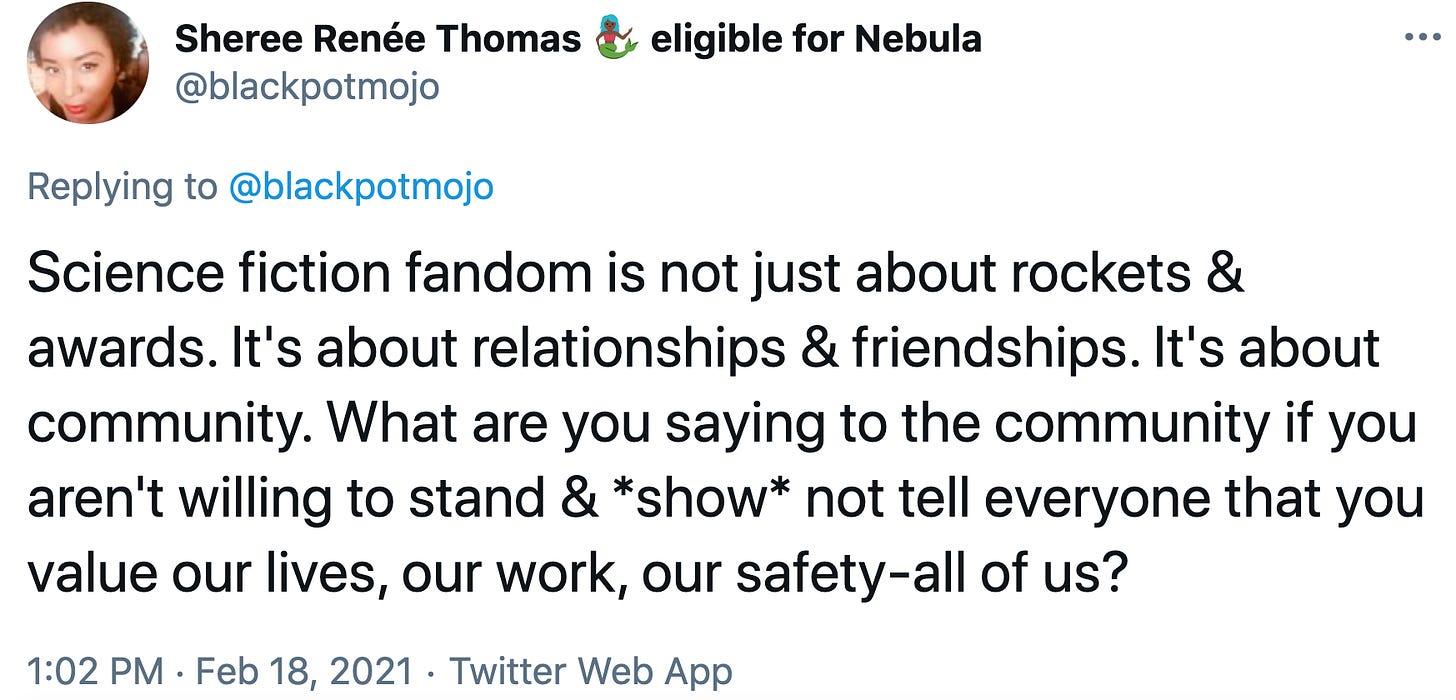
[While you’re here, consider signing up for Sanford’s Patreon — he does a lot of really excellent work that covers genre happenings.]
Gina Carano fallout
Last week, I wrote extensively about Gina Carano’s firing from Lucasfilm, and since then, additional details have come to light about the incident. The Hollywood Reporter and Deadline outlined some sourced details about the timeline of what had happened.
First, Carano’s tweets and Instagram posts had some pretty immediate ramifications for her: she was removed from the press tour prior to The Mandalorian’s second season because of the tweets. Disney apparently crafted an apology for her to use for mocking trans pronouns, but she blew them off with her own apology. That seems to be the start of the problems for her on the business end. She was apparently “repeatedly been warned by those around her about her social media behavior,” and knew that her posts would cause an uproar, but went ahead anyway. Again, fuck around and find out.
We also knew that she was going to be part of the Disney Investor’s Day conference: it sounds as though the presentation that LFL prepared actually included the project, but they pulled out that particular slide as her comments generated controversy. And the final kick in the pants? Hasbro has apparently pulled her action figures from production and own’t release any more.
Disney’s response here has gotten some segments of fandom in an tizzy, but as one Twitter user pointed out, it’s helpful to see what they were saying about Carano when she was originally revealed:

Renfamous⭐️ @renfamousFun game for tomorrow: find a video of a male YouTuber screaming about Disney “cancelling their best female Star Wars character”, scroll back about a year in their videos and check out what they had to say about the Cara Dune character when she debuted in season one.
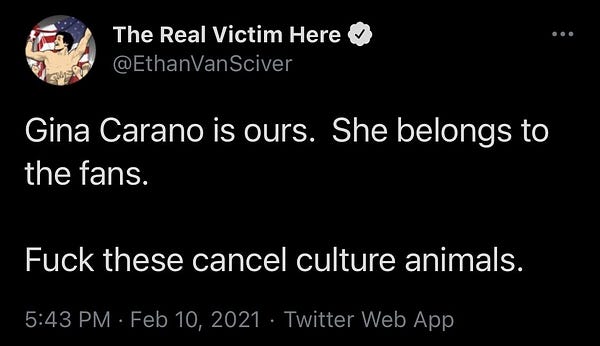
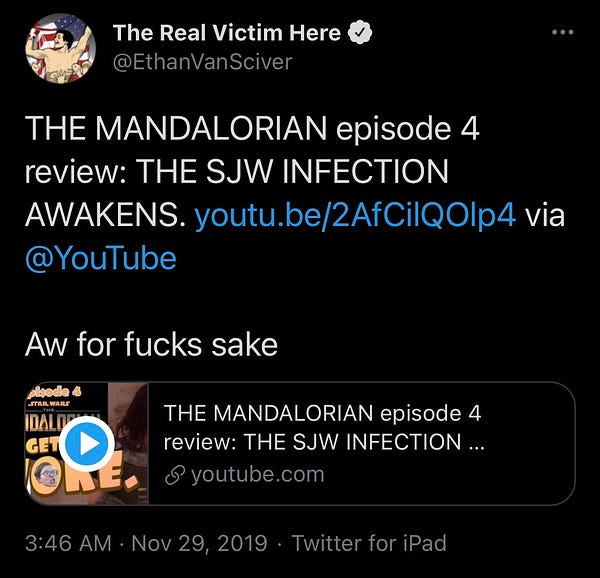
February 11th 20218,812 Retweets41,503 Likes
Yeah — their care and appreciation for the character seems a little less heartfelt and a bit more opportunistic.
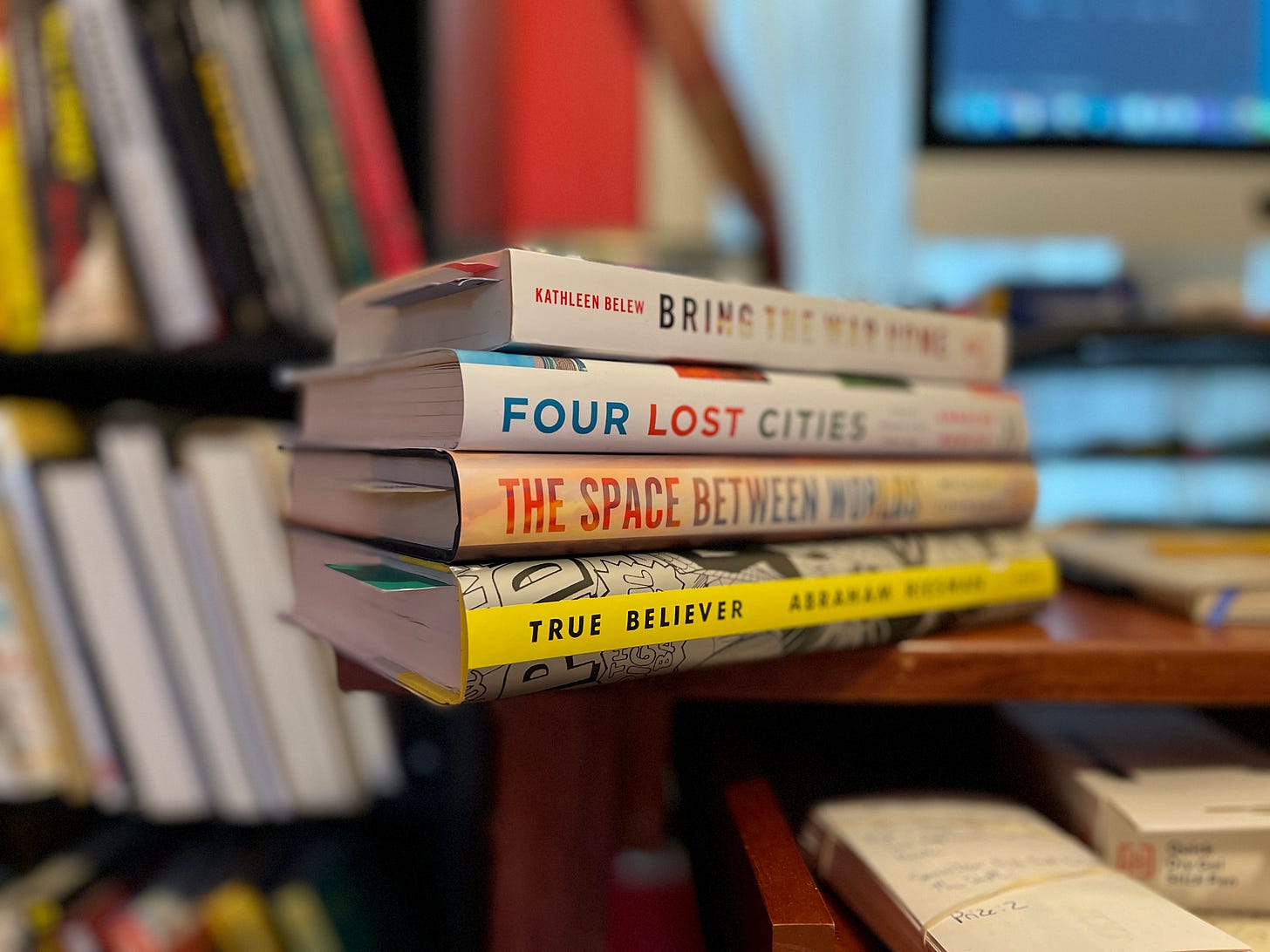
Currently reading
Take last week’s CR and copy it here. I’ve been burning through Micaiah Johnson’s The Space Between Worlds, and have been working my way through Abraham Riesman’s True Believer: The Rise and Fall of Stan Lee.
Also on the list:
- Four Lost Cities: A Secret History of the Urban Age by Annalee Newitz
- Light of the Jedi by Charles Soule
- Bring the War Home by Kathleen Belew
- Veil by Eliot Peper
- We Could Be Heroes by Mike Chen
- Persephone Station by Stina Leicht
My son has his winter break next week, so we’re going to be heading out for some time at a family camp for a couple of days to unplug and get out of the house for a change of scenery. Hopefully, I’ll get to block out some good reading time there to clear off that TBR shelf and add some new things onto it.
Further reading
Reduced to “Content”. Director Martin Scorsese has a long essay up on Harper’s Magazine about the value of cinema, and has an excellent line to kick it off with: “Flash forward to the present day, as the art of cinema is being systematically devalued, sidelined, demeaned, and reduced to its lowest common denominator, ‘content.’”
It’s an excellent essay about the value of art and its place here. He looks at the works of Italian filmmaker Federico Fellini and how he experimented with cinema as an art form, leaving behind a considerable influence on filmmakers that followed.
There’s an element of “old man yells at clouds” thing here, but I think he makes a valid point: art needs to be something that’s risky and personal, and that there’s a distinction between the “movie business” and “cinema”.
In the movie business, which is now the mass visual entertainment business, the emphasis is always on the word “business,” and value is always determined by the amount of money to be made from any given property—in that sense, everything from Sunrise to La Strada to 2001 is now pretty much wrung dry and ready for the “Art Film” swim lane on a streaming platform. Those of us who know the cinema and its history have to share our love and our knowledge with as many people as possible. And we have to make it crystal clear to the current legal owners of these films that they amount to much, much more than mere property to be exploited and then locked away. They are among the greatest treasures of our culture, and they must be treated accordingly.
I use the words like “content” and “franchise” and “IP” a lot, and this is a really good reminder that the value of stories extends beyond their status as a property.
Lessons Learned. This year marks the 10th anniversary of the debut of HBO’s Game of Thrones, and Charlie Jane Anders has an excellent list up on her newsletter: 7 Wrong Lessons That Creators Learned from Game of Thrones. The show was a massive hit, and when that happens, Hollywood tries to deconstruct the success to figure out what happened. This is a good look at some of the missed opportunities that we’ve seen, and she IDs two points in particular that I think are the most important: “complexity is automatically interesting”, and making everything grim and dark is the way to go. Game of Thrones is certainly complex, but that’s borne by the world and depth of story, rather than a more superficial complexity.
The grim/dark argument is one that goes back even further: look at the trends in comics in the 1980s — especially the works of Frank Miller and Batman. Glen Weldon makes a compelling argument in his book The Caped Crusade: Batman and the Rise of Nerd Culture that entertainment (particularly superheroes) tends to go from light and fun to grim and dark, and that it’s largely unnecessary, because the darker and grimer you go, there’s always someone trying to find that bottom. (Sign up for her newsletter while you’re there — it’s great!)
Literacy as a social defense. Barbara Fister has an interesting piece up on The Atlantic (originally published in the Project Information Literacy Provocation Series) about the role of critical literacy skills play in a societal defense against misinformation and conspiracy theories. The US has long had an anti-intellectualism streak, and this seems a bit like an updated version of that. Conspiracy theories like Qanon have been bolstered by a distrust of authority figures and experts. What struck me was an observation about how people went about gathering information:
“many conservatives read the news using techniques learned through Bible study, shunning secular interpretations of events as biased and inconsistent with their exegesis of primary texts such as presidential speeches and the Constitution.”
This seems to fit with a piece I read in Salon recently: “I think Dan Brown turned my parents into QAnoners”, in that folks are looking for hidden meanings and messages and clues in source texts, and extrapolating from there. Obviously, this isn’t how actual research is conducted, and libraries and teachers need to play a major role in educating the public about how to accurately gather information and to recognize when something is false.
- Throughline on Octavia Butler. Octavia Butler has certainly had a lot of think-pieces written about her recently. The latest comes from NPR’s Throughline: “How Octavia Butler's Sci-Fi Dystopia Became A Constant In A Man's Evolution,” about her novel Parable of the Sower. It’s a good, hour-long listen for when you go out in the car or take a walk or something.
- Rainbow shelves. Allie Alvis writes on her blog about the pearl-clutching reaction that a lot of people have when someone organizes their books by color. I’ll admit that I’ve had this reaction before (hOw Do PeOpLe FiNd StUfF?!) — thinking that it’s a superficial thing, but I’ve come to really like it, realizing that a) it’s their bookshelf and they can do with it what they want and b) what someone’s bookshelf looks like is a reflection of their tastes and interests, even aesthetically. Given how many people came to me when I was a bookseller asking for “that recent book with a blue cover”, I suppose I can understand that a bit. This post serves as a good history for books in general, and it’s a blog that I’m definitely going to be reading more of.
- Thoughts on “Cancelled”. There’s been a lot of angst about “cancel culture”, and more than enough think pieces about it. John Scalzi has some good thoughts about how to frame the discussion, and what’s being missed in it: essentially, that at the heart of a “cancellation” is just a person that a company decides isn’t worth the effort keeping on because they’re bringing in too much controversy or pain. This makes sense to me: companies — especially in the entertainment sector — really don’t want the discussion about their cast / crew / projects to be a detraction from the work. I guarantee you that Disney would rather people be talking about Star Wars and not Gina Carano being awful online. He makes an excellent point here as well: “When you’re privileged, consequence feels like oppression.”
- What might have been. Polygon has a bit of interesting film history from Drew McWeeny about the evolution of Peter Jackson’s Lord of the Rings trilogy — it was originally planned as a pair of films, then scaled up into a proper trilogy, which he read while writing for Ain’t It Cool years and years ago. It’s an interesting read. If it’s something that you like, I’d recommend following it up with Ian Nathan’s Anything You Can Imagine: Peter Jackson and the Making of Middle-earth, an in-depth look at the entire production, which came out in 2018.
As always, thanks for reading. Let me know what you’ve got on your TBR pile, and what you’ve been reading this week.
Andrew